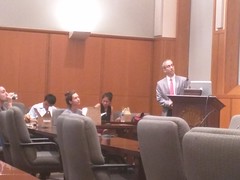Don't just run your community meetings as presentations; instead engage in real multi-way dialogue around important questions.
Push is Knowledge Supply - an answer looking for a problem - "Just in case" KM, with re-use only in the case where the knowledge happens to meet a need. Pull is knowledge demand - a problem looking for an answer - "Just in time" KM, with guaranteed re-use.
The need for creating Pull operates at many levels - in Communities of Practice, on websites, even in face to face meetings.
However very often community meetings are not designed this way. Very often they as "show and tell" meetings, where an expert is brought in, and the community members sit passively and listen. The members are treated as knowledge consumers, whereas the real value of a community is that ever member has knowledge to offer, as well as knowledge to learn.
One variant of these meetings is the dreaded "lunch and learn" - one of my pet hates. There are many reasons why I dislike "lunch and learn";
- they assume that community meetings can't take place in "real working hours" and need to be held at lunchtime (thus perpetuating the idea that "KM is not Real Work";
- they assume you can eat and listen - that you don't need to pay full attention;
- they assume you don't need to take any notes (with your hands full of sandwiches);
- they assume that the people who turn up will be passive listeners and not active contributors. After all, how much can you contribute with your mouth full of food?
This is the worst way to transfer knowledge - a one-way presentation to a bunch of people who are busy doing something else.
If this is your approach to community meetings, then consider turning the meeting around, and base it around Questions and around Dialogue. Identify before hand the major questions and problems within the CoP (maybe using a Knowledge Market approach) , and build the agenda around those questions. Use the collective knowledge of the Community to address the questions. Bring that knowledge to bear on the most pressing business problems, so that every person leaves the meeting with a problem solved, and with new connections, new links, and a renewed sense of community value, and having contributed as much as they gained.
Maybe use a knowledge exchange approach, with small problem-solving break-out groups to make sure that everyone was involved in the dialogue. Not a series of presentations that probably very few people would be interested in, even if they weren't eating lunch at the same time.





1 comment:
This all depends on the facilitator. I have run "work time" sessions and learning lunches and as long as you make the session enjoyable, informative and have the group participate this is a relaxed way of getting the message across to people who are already busy. Use of open questions and statements brings responses and input from the audience and the relaxed atmosphere (with a free lunch) is ideal to allow their brains to soak up the message even if it is subliminally done. If you are training then I agree classroom workshops are best but if you are trying to develop a culture the lunch time sessions are a great starting point.
Post a Comment